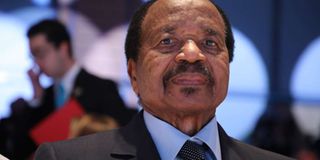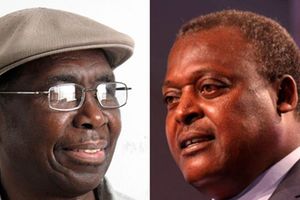Premium
Lobby asks UN to probe death of Cameroon journalist Samuel Wazizi

What you need to know:
- Police arrested the journalist on August 2, 2019 in a suburb in the conflict-ridden Southwest region of the country and he died of “severe sepsis” two weeks later.
- President Paul Biya, who has ruled Cameroon since 1982 with an iron fist, promised an independent and transparent investigation into the journalist’s death, but it is yet to materialise two months later.
- Like the RSF, Wazizi’s family, colleagues, lawyers and other press freedom groups also suspected the military account of the journalist’s death was not consistent with the reality.
Yaounde,
Paris-based press freedom advocacy group Reporters Without Borders (RSF) wants the United Nations to investigate the circumstances under which Cameroonian journalist Samuel Wazizi, whose legal was Samuel Ajiekah Abuwe, died.
Police arrested the journalist on August 2, 2019 in a suburb in the conflict-ridden Southwest region of the country and he died of “severe sepsis” two weeks later while in military custody in the capital.
The military made his death public only on June 5, 2020 following intense pressure.
RSF, one of the press freedom groups that doubted the government account, said it sent a letter on the situation to the UN special rapporteurs on extrajudicial executions, freedom of opinion and torture.
RSF said its August letter to three rapporteurs called for an investigation and the prosecution of those responsible in accordance with international standards.
It suggested the journalist may have died as a result of torture by the soldiers who held him.
President’s promise
President Paul Biya, who has ruled Cameroon since 1982 with an iron fist, promised an independent and transparent investigation into the journalist’s death, but it is yet to materialise two months later.
“The government’s version is riddled with inconsistencies and we doubt that we will learn the truth from the promised investigation. We therefore urge the United Nations to do everything in its power to ensure the circumstances resulting in Samuel Wazizi’s death are established,” said Paul Coppin, the head of RSF’s legal unit.
Like the RSF, Wazizi’s family, colleagues, lawyers and other press freedom groups also suspected the military account of the journalist’s death was not consistent with reality.
In June, the Committee to Protect Journalists (CPJ) said the Cameroonian government’s cruel treatment of the journalist was “truly shocking.”
“It is unbelievable that authorities covered up his death in custody for 10 months despite repeated inquiries from press freedom advocates and his family, colleagues, friends, and lawyers,” Angela Quintal, CPJ’s Africa Programme Coordinator said then.
The accusations
A presenter on Buea-based Chillen Media Television (CMTV), Wazizi was accused of having links with armed separatists fighting since 2017, aimed at creating an independent Anglophone state called Ambazonia.
The military said in a statement that he was “a logistician for various terrorist groups,” in the region.
The English speaking Northwest and Southwest regions of Cameroon have remained volatile since a peaceful demonstration by teachers and lawyers, over perceived marginalisation, morphed into an armed conflict in 2017.
The bloody conflict has left more than 3,200 dead and displaced 700,000 others in the past three years, RSF notes.
Hundreds others are behind bars in connection to the crisis and rights groups say the crackdown on Wazizi was related to his critical reporting of the conflict.
Respect for press freedom has been declining for years in Cameroon and deteriorated more in the wake of the armed conflict in the Anglophone regions, with journalists exposed to a high risk of threats and arbitrary arrest, according to monitors.
The central African country is rated “Not Free” by Freedom House and 134th out of 180 countries, the first being the freest, according to RSF's 2020 World Press Freedom Index.
The score is three places lower than its 2019 position of 131.





